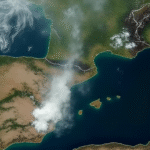Recent Political Assassinations in Mexico
In the last 36 hours, Mexico has experienced a surge in political violence with the assassination of at least five politicians across various regions of the country.
Luis Armando Córdova Díaz
On the morning of May 13, former PRI legislator Luis Armando Córdova Díaz was gunned down inside a shopping mall in Zapopan, Jalisco, while waiting for someone at a café. Córdova Díaz, who served as the PRI’s Secretary of Political Alliances and Citizen Agenda in Jalisco, was attacked by individuals who fled on motorcycles. According to the state’s attorney general, Salvador González, security cameras captured at least two assailants.
Alejandro Moreno, the national president of PRI, described Córdova Díaz’s murder as “a reflection of the level of violence and impunity that exists in Mexico.”
Esteban Alfonseca Salazar and Edmundo Martínez Pérez
Early morning on May 13 in Actopan, Veracruz, ex-mayor Esteban Alfonseca Salazar and ex-councilman Edmundo Martínez Pérez were killed while returning from a political rally supporting Morena’s candidate for mayor, Eduardo Utrera Carreto. The attack occurred on the Santa Rosa-Actopan highway.
Alfonseca, who served as mayor under the PRI and was recently a candidate for Fuerza por México, was remembered by state officials as a politician close to the people. His murder adds to other attacks recorded during the electoral process in the state.
Yesenia Lara Gutiérrez
On the night of May 12, Yesenia Lara Gutiérrez, Morena’s candidate for the Texistepec municipal presidency in Veracruz, was shot during an attack on her campaign caravan following a rally. The assault left four people dead and three injured.
Gerardo Leobardo Santos López
On May 11, the Partido de la Revolución Democrática (PRD) confirmed the murder of Gerardo Leobardo Santos López, a former mayor and candidate for the Santa María Ipalapa ayuntamiento in Oaxaca. The killing was labeled as a direct attack against democracy and freedom.
Impact on Mexican Politics
Experts warn that the political violence in Mexico not only threatens the safety of candidates and officials but also severely distorts democratic processes.
Lisa Sánchez, executive director of Mexico United Against Crime (MUCD), explained that one alarming aspect of political violence is how criminal organizations have started competing politically through their own candidates or by violently eliminating those unfavorable to them.
“Criminals are establishing what we know as criminal governance, exerting territorial control and managing social coexistence and conflict within those territories through political influence,” Sánchez said.
“They influence elections by adding or removing candidates, intimidating, bribing, or killing them. Ultimately, citizens end up voting for pre-filtered candidates by crime,” she warned.
This phenomenon significantly affects electoral participation and undermines public trust in institutions, according to the expert.
“Violence hinders the installation of polling stations, the presence of observers, and ultimately, the full exercise of free voting,” Sánchez added.
“Criminal organizations have made homicidal violence the most effective method to neutralize those who pose a threat to their interests,” opined Armando Vargas, coordinator of Mexico Evalúa’s Security Program.
In an interview, Vargas detailed that in violence-prone states like Veracruz, public distrust intensifies.
“The population clearly perceives that organized crime has decision-making power in who wins or loses an election. Evidence shows that with each political-criminal attack, the number of actors participating in electoral processes decreases,” he said.
Proposed Solutions
To reverse this situation, Armando Vargas suggested short-term and long-term measures.
In the immediate future, he emphasized the need to revise candidate protection protocols with new targeting criteria since official crime statistics do not accurately reflect the presence of organized crime.
In the long term, he advised deep political reform at the municipal level to strengthen local institutions, particularly police forces, and prevent criminal infiltration.
According to Integralia data, 50 political killings were recorded in the first quarter of the year. Guerrero and Morelos lead the list of the most violent regions, with seven reported murders each.
Morena, the Green Party, and the Labor Party have the highest number of cases in this alliance.
Key Questions and Answers
- Who are the recent victims of political violence in Mexico? The recent victims include Luis Armando Córdova Díaz, Esteban Alfonseca Salazar, Edmundo Martínez Pérez, Yesenia Lara Gutiérrez, and Gerardo Leobardo Santos López.
- What impact does this violence have on Mexican politics? The violence not only endangers candidates and officials but also severely distorts democratic processes by allowing criminal organizations to influence elections through intimidation, bribery, or assassination.
- What measures are proposed to address this issue? Short-term solutions include revising candidate protection protocols, while long-term measures involve deep political reform at the municipal level to strengthen local institutions and prevent criminal infiltration.
- How many political killings have been recorded in Mexico this year? According to Integralia, there have been 50 reported political killings in the first quarter of the year.






